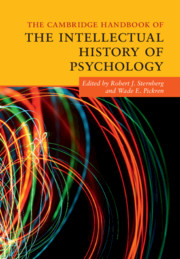Book contents
- The Cambridge Handbook of the Intellectual History of Psychology
- The Cambridge Handbook of the Intellectual History of Psychology
- Copyright page
- Contents
- Figures
- Tables
- Contributors
- Introduction
- 1 Major Paradigms and Approaches in Psychology
- 2 Methodology in Psychology
- 3 Neuroscience in Psychology
- 4 Sensation and Perception
- 5 Attention: Awareness and Control
- 6 Learning
- 7 Memory
- 8 Decision-Making
- 9 Creativity
- 10 Intelligence
- 11 Development
- 12 Social Psychology
- 13 Gender
- 14 Emotion
- 15 Motivation
- 16 Personality
- 17 Abnormal Psychology
- 18 Psychotherapy
- 19 Health Psychology
- Index
- References
15 - Motivation
Published online by Cambridge University Press: 18 May 2019
- The Cambridge Handbook of the Intellectual History of Psychology
- The Cambridge Handbook of the Intellectual History of Psychology
- Copyright page
- Contents
- Figures
- Tables
- Contributors
- Introduction
- 1 Major Paradigms and Approaches in Psychology
- 2 Methodology in Psychology
- 3 Neuroscience in Psychology
- 4 Sensation and Perception
- 5 Attention: Awareness and Control
- 6 Learning
- 7 Memory
- 8 Decision-Making
- 9 Creativity
- 10 Intelligence
- 11 Development
- 12 Social Psychology
- 13 Gender
- 14 Emotion
- 15 Motivation
- 16 Personality
- 17 Abnormal Psychology
- 18 Psychotherapy
- 19 Health Psychology
- Index
- References
Summary
This history of the scientific field of human motivation is demarcated by several distinct phases, each of which evolved toward a new general hypothesis. We begin that history with the speculations of Darwin on the adaptive nature of certain propensities and emotional reactions. Early work by Karl Groos, Robert Woodworth, and others explored play and interest as important natural tendencies in primates and humans. Yet the advent of behaviorism, through both drive theory (Hullian) and operant (Skinnerian) schools, crowded out these ideas, instead focusing the field on how external reinforcements shape and maintain behaviors. The significance of cognitive mediators, especially people's expectancies and value for reinforcements soon became the focus of psychology’s cognitive revolution, as exemplified in work by Julian Rotter and Albert Bandura. Simultaneously, especially spawned by the work of Robert White, interest grew in the intrinsic motivations underlying much learning and development, leading to today’s focus on topics such as achievement motivation, personal goals, self-determination, and volition. Across this history we see the important role played by normal science and advancements in methods in both developing and ultimately revealing the limitations of preceding paradigms, leading to systematic growth, as well as ongoing debates within the field.
Keywords
- Type
- Chapter
- Information
- The Cambridge Handbook of the Intellectual History of Psychology , pp. 391 - 411Publisher: Cambridge University PressPrint publication year: 2019
References
- 9
- Cited by

